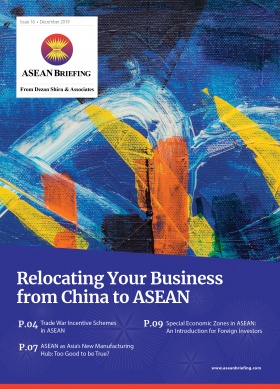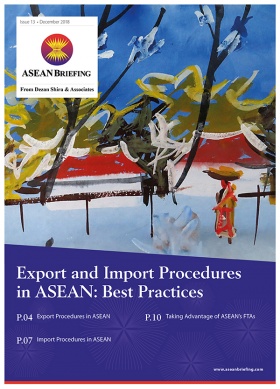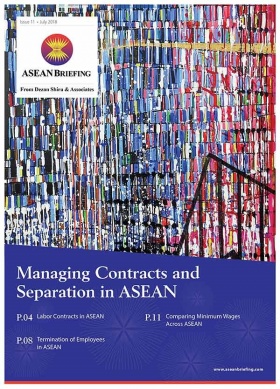Malaysia’s PENJANA Stimulus Package: Key Features
- Malaysia issued its latest stimulus package on June 9, 2020, valued at 35 billion ringgit (US$8.1 billion).
- This stimulus package provides an array of tax incentives, financial support for businesses, and wage subsidies.
- Malaysia has now issued over 290 billion ringgit (US$67 billion) worth of incentives since February 2020.
On June 9, 2020, Malaysia issued its fourth economic stimulus package, named the Pelan Jana Semula Ekonomi Negara (PENJANA), which is primarily aimed at helping businesses recover from the impact of the coronavirus pandemic.
The latest package is valued at 35 billion ringgit (US$8.1 billion), bringing the total value of the country’s stimulus packages to over 290 billion ringgit (US$67 billion). Some of the measures issued in PENJANA include new tax incentives, financial assistance for small and medium-sized businesses (SMEs), and job protection initiatives.
The government began restricting lockdown measures from June 10, 2020, and is expected to last until August 31. Under this phase, most sectors of the economy can begin operations, which includes barbershops, markets, and private companies. Interstate travel has also been allowed except for red zones although entertainment venues, such as theme parks will remain closed. Schools will be opened gradually based on recommendations from the Ministry of Health.Investors should seek the assistance of local advisors to better understand how they can benefit from these relief measures.
Tax incentives under PENJANA
PENJANA provides a variety of new and enhanced tax incentives, ranging from tax exemptions and deductions for the manufacturing sector as well as the establishment of new businesses.
Attracting foreign investments
To attract foreign companies to relocate their operations to Malaysia, the country will grant:
- A zero percent tax rate for 10 years for companies in the manufacturing sector with investments in fixed assets between 300 million ringgit (US$70 million) and 500 million ringgit (US$116 million);
- A zero percent tax rate for 15 years for companies in the manufacturing sector with investments in fixed assets exceeding 500 million ringgit (US$116 million);
- 100 percent investment tax allowance for three years for an existing company in Malaysia that will relocate its overseas facilities into the country;
- A special reinvestment allowance for selected manufacturing and agricultural activities for the year of assessment (YA) 2020 to YA 2021;
- Additional capital injected for the Malaysian Investment Development Authority (MIDA); and
- The approval of a manufacturing license for non-sensitive industries within two working days.
Encouraging the establishment of new businesses
The government will provide the following incentives to catalyze the establishment of new businesses and transactions:
- Income tax rebate of up to 20,000 ringgit (US$4,670) per year for the first three years for a small and medium-sized enterprise (SME) incorporated between July 1, 2020, and December 31, 2020; and
- The exemption of stamp duty on any instruments executed for mergers and acquisitions between Jul 1, 2020, and June 30, 2021.
Export duty exemptions
PENJANA will provide financial relief for the commodity sector by giving a 100 percent export duty exemption for businesses engaged in crude palm oil, crude palm kernel oil, and refined bleached deodorized palm kernel oil effective from July 1, 2020, to December 31, 2020.
Remission of tax penalties and enhancement of ACA
PENJANA will aim to relieve the cashflow of businesses by offering remissions of penalties for late tax payments.
Eligible businesses can receive up to 50 percent remission of penalties for the late sales and service tax payments due and payable from July 1, 2020, to September 30, 2020.
The government will also enhance the incentives provided under the Accelerated Capital Allowance (ACA) program to include capital expenditure incurred on information and communications technology (ICT) equipment.
Tax deduction on reduction or waiver of rental
In the previous stimulus packages, landlords were eligible to tax deductions equivalent to the 30 percent reduction in rental from April to June 2020. This has now been extended to September 2020 under the PENJANA package.
This incentive is eligible for landlords that rent their premises to SME tenants and the premises must be used for their business operations.
Incentives for the tourism sector
The tourism sector has been heavily impacted by the pandemic. The country was expected to welcome 30 million tourists in 2020 and generate some US$20 billion in revenue from this sector.
PENJANA initially extended the support issued in the previous stimulus package issued in February 2020, such as the personal income tax relief of up to 1,000 ringgit (US$233) incurred on domestic travel between March 1 2020 to August 31 2020. This has now been extended to December 31, 2020.
Furthermore, businesses in the tourism industry (airlines, hotel operators, travel agencies, etc.) were eligible to defer on their income tax instalments for the period April 1, 2020, to September 30, 2020. This has also been extended for another three months for the applicable period of October 1, 2020, to December 31, 2020.
The government has extended the service tax exemption for hotels to June 30, 2021, from the previous deadline of August 31, 2020.
Incentives for the property sector
To stimulate the domestic property market, the government will reintroduce the Home Ownership Campaign (HOC). The HOC ran throughout 2019 and was designed to encourage more home ownership in the country.
Under PENJANA, the instruments of transfer and loan agreements for the purchase of a residential property valued between 300,000 ringgit (US$70,000) to 2.5 million ringgit (US$584,000) will be exempt from stamp duty.
This exemption of stamp duty on the instruments of transfer is limited to the first 1 million ringgit (US$233,000) while the full stamp duty exemption is given to loan agreements.
This incentive is available for sales and purchase agreements executed between June 1, 2020 and May 31, 2021. Additionally, the property developer participating in the HOC program must provide at least 10 percent discount on the price of the property.
Exemption of real property gains tax
Under this incentive, any gains arising from the disposal of residential property from June 1, 2020, to December 31, 2021, will be exempt from real property gains tax. This is limited to three residential property per individual (Malaysian citizens).
Moreover, during the HOC period, the 70 percent margin on housing loan for a third residential property valued at 600,000 ringgit (US$140,000) and above will be lifted, although the government has not stated by how much.
Incentives for the purchase of passenger cars
Car buyers can receive a full sales tax exemption on locally assembled cars and a 50 percent sales tax exemption on imported cars.
Relief for COVID-19 expenses
The government is hoping to encourage businesses to adhere to the new health protocols by expanding the scope and extending the period of expenses allowed as a tax deduction for the prevention of COVID-19. This includes the cost of protective equipment and screening tests.
Flexible work arrangement incentives
Employers who implement flexible work arrangements (such as work-from-home policies) are eligible to receive further tax deductions effective from July 1, 2020.
Also effective from July 1, employees who receive cell phones, tablets, and notebooks from their employer are eligible for individual income tax exemption of up to 5,000 ringgit (US$1,160).
Employees that purchase a cell phone, tablet and notebook can receive individual income tax relief of up to 2,500 ringgit (US$584), effective from June 1, 2020.
More assistance for businesses
In addition to tax incentives, the stimulus package provides financing measures and subsidies for businesses in the country.
Extension of the wage subsidy program
The wage subsidy program has been extended for a further three months until September 2020. Under this program, employers with workers earning less than 4,000 ringgit (US$935) per month will be eligible to receive 600 ringgit (US$140) per employee, up to a maximum of 200 employees.
Additionally, this incentive has been enhanced to allow employers receiving wage subsidies to implement reduced work weeks and to allow employers to receive wage subsidies for employees on unpaid leave.PENJANA SME financing
To ease the cashflow problems of SMEs, the banking sector will provide 2 billion ringgit (US$467 million) at an interest rate of 3.5 percent. Eligible SMEs can apply for a maximum 500,000 ringgit (US$116,000).
PENJANA microfinancing
Apart from SMEs, micro enterprises have also been severely impacted by the extended lockdown and low consumer demand. As such, 400 million ringgit (US$93 million) is earmarked for this sector at an interest rate of 3.5 percent. Eligible businesses can apply up to 50,000 ringgit (US$11,600).
The government has allocated 50 million ringgit (US$11.6 million) to assist women entrepreneurs.
Digitalization of SMEs
The government will continue to support SMEs looking to digitalize their operations or automate their business through grants and loans from three programs. These are:
- The SME Digitalization Matching Grant, totaling 100 million ringgit (US$23 million), developed in cooperation with telecommunication companies in the country;
- The SME Technology Transformation Fund, which has prepared 500 million ringgit (US$116 million) in loans. Application for the loans opens in July 2020; and
- The Smart Automation Grant, totaling 100 million ringgit (US$23 million). The amount that companies can apply for through this grant is capped at 1 million ringgit (US$233,000).
PENJANA tourism financing
More details of this incentive will be issued in July but aid worth 1 billion ringgit (US$233 million) has been earmarked to help SMEs adapt to the ‘new normal’ and remain sustainable.
BUMIPUTERA relief financing
The government has prepared 500 million ringgit (US$116 million) in funding to assist Bumiputera entrepreneurs. Bumiputera is a term used to describe ethnic Malays in the country who make up the majority of the population.
Through this program, 200 million ringgit (US$46 million) is allocated for Bumiputera-owned businesses in the form of:
- Working capital;
- Operational expenditure;
- System automation;
- Expenditure to implement COVID-19 health protocols; and
- Financing of 50,000 ringgit (US$11,600) to 1 million ringgit (US$233,000) at an interest rate of 3.5 percent for up to five years.
Furthermore, through the Majlis Amanah Rakyat (MARA) – the government agency responsible to aid, train, and guide Bumiputeras in the areas of business and industry – the government has allocated 300 million ringgit (US$70 million) to assist Bumiputera entrepreneurs, who can also receive up to 1 million ringgit (US$233,000) at an interest rate of 3.5 percent.
SME Go-Scheme liquidity support
The Small Medium Enterprise Bank (SME Bank) will provide liquidity support to contractors who were awarded projects under the previous two stimulus packages. The government has earmarked 1.6 billion ringgit (US$373 million) for this incentive.
This is expected to benefit 16,000 G2 and G3 contractors who do not need to provide deposits or collateral.
Support for the agriculture industry
For businesses in the agriculture and food supply industry, PENJANA has allocated a micro-credit financing scheme worth 350 million ringgit (US$81 million) at an interest rate of 3.5 percent per year.
The tenure of the loan is set at five years and ‘agropreneurs’ can receive up to 50,000 ringgit (US$11,600)
Hiring of local workers
The stimulus package provides incentives to encourage local companies to hire the unemployed.
Graduates and school leavers can receive 600 ringgit (US$140) per month for apprenticeships for up to six months.
Businesses hiring an employee below the age of 40 will receive 800 ringgit (US$186) for up to six months and 1,000 ringgit (US$233) for hiring an employee above the age of 40 or a person with a disability.
Reskilling and upskilling programs
Some 2 billion ringgit (US$467 million) in funding has been allocated to help with the reskilling of graduates and the unemployed.
The funds will go towards optimizing short courses in local universities and training programs provided by government agencies.
Assistance to the most vulnerable in the community
The package will provide 108 million ringgit (US$25 million) to help the most vulnerable members of society.
A one-off 300 ringgit (US$70) payment will be given to:
- 190,000 registered disabled persons;
- 150,000 single mothers who are below the poverty line; and
- 2,000 volunteer home help services.
About Us
ASEAN Briefing is produced by Dezan Shira & Associates. The firm assists foreign investors throughout Asia and maintains offices throughout ASEAN, including in Singapore, Hanoi, Ho Chi Minh City and Jakarta. Please contact us at asia@dezshira.com or visit our website at www.dezshira.com
- Previous Article The Philippines Prepares New Stimulus Program: CREATE Act
- Next Article Thailand to Impose Digital Service Tax: Impacting Foreign Providers








